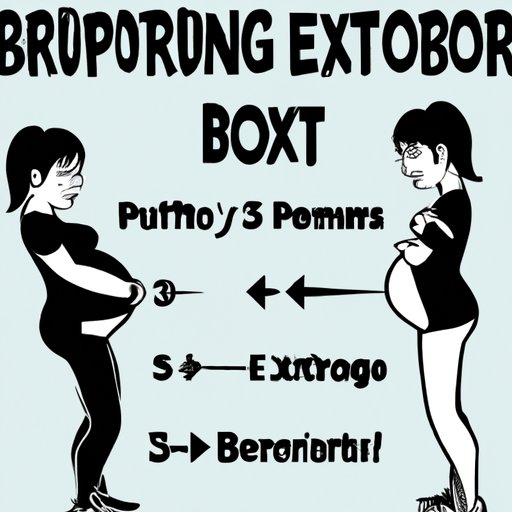Introduction
Pregnancy is an exciting time for expectant mothers, but it can also be filled with anxiety and uncertainty. As the baby grows within the womb, many women are eager to know how their lifestyle choices, such as diet and exercise, will impact their unborn child. In this article, we will explore what happens to a fetus when mom exercises during pregnancy.
Overview of Fetal Development
The fetal stage of development begins at week 8 after conception and ends at the end of pregnancy. During this period, the fetus rapidly develops in size and complexity. Over the course of these nine months, the fetus will grow from two cells to billions of cells, forming all of the necessary organs and body systems to survive outside the womb. The fetus is nourished and protected by the placenta, a specialized organ that provides nutrients and oxygen to the developing baby.
Benefits and Risks of Exercising During Pregnancy
Exercise during pregnancy can provide many benefits, including improved mood, increased energy levels, better sleep, and reduced stress. Exercise can also help prepare your body for labor and delivery, as well as reduce the risk of certain pregnancy complications, such as gestational diabetes and preeclampsia. However, there are also risks associated with exercising during pregnancy, including increased risk of preterm labor, placental abruption, and low birth weight.

The Effects of Exercise on Fetal Development
When it comes to exercising during pregnancy, it is important to understand how it may affect the unborn baby. Studies show that moderate physical activity is generally safe for pregnant women and their babies, however, it is still important to be aware of the potential risks. Here, we will explore how exercise may affect the fetus during pregnancy.

How Exercise Affects the Fetus During Pregnancy
Exercise during pregnancy can have both positive and negative effects on the fetus. On one hand, regular physical activity can improve maternal health and promote healthy fetal development. Studies have found that pregnant women who exercise regularly tend to have healthier babies and shorter labor times than those who do not. Regular exercise can also help to reduce the risk of certain pregnancy complications, such as gestational diabetes and preeclampsia.
On the other hand, too much exercise can put the fetus at risk. High-intensity exercise can cause the mother’s heart rate and body temperature to rise, which can reduce the amount of oxygen and nutrients available to the fetus. It can also increase the risk of preterm labor, placental abruption, and low birth weight. Therefore, it is important to talk to your doctor before starting any exercise program during pregnancy.

Understanding the Impact of Exercise on Your Unborn Baby
It is important to understand the potential risks and benefits of exercising during pregnancy. Talk to your doctor about what types of exercise are safe for you and your baby. Generally speaking, low-impact activities, such as walking, swimming, and yoga, are considered safe for most pregnant women. Avoid high-intensity activities, such as running or contact sports, as these can put additional strain on your body and your baby.
What Happens to a Fetus When Mom Exercises?
Exercising during pregnancy can have both positive and negative effects on the fetus. On one hand, regular physical activity can improve maternal health and promote healthy fetal development. On the other hand, too much exercise can put the fetus at risk. Therefore, it is important to talk to your doctor before starting any exercise program during pregnancy.
Exploring the Effects of Exercise on the Unborn Baby
Studies have shown that regular physical activity during pregnancy can benefit both mother and baby. Regular exercise can help to reduce the risk of certain pregnancy complications, such as gestational diabetes and preeclampsia. It can also help to prepare the body for labor and delivery. Additionally, regular exercise can improve the mother’s mood, energy levels, and sleep quality.
However, it is important to remember that too much exercise can put the fetus at risk. High-intensity activities can cause the mother’s heart rate and body temperature to rise, which can reduce the amount of oxygen and nutrients available to the fetus. It can also increase the risk of preterm labor, placental abruption, and low birth weight. Therefore, it is important to talk to your doctor before starting any exercise program during pregnancy.
The Benefits and Risks of Exercising During Pregnancy
Exercising during pregnancy can provide many benefits, such as improved mood, increased energy levels, better sleep, and reduced stress. However, it is important to remember that there are also risks associated with exercising during pregnancy, including increased risk of preterm labor, placental abruption, and low birth weight. Therefore, it is important to talk to your doctor before starting any exercise program during pregnancy.
Conclusion
Exercising during pregnancy can provide many benefits for both mother and baby. Regular physical activity can help to reduce the risk of certain pregnancy complications, such as gestational diabetes and preeclampsia. It can also help to prepare the body for labor and delivery. However, it is important to remember that too much exercise can put the fetus at risk. Therefore, it is important to talk to your doctor before starting any exercise program during pregnancy.


